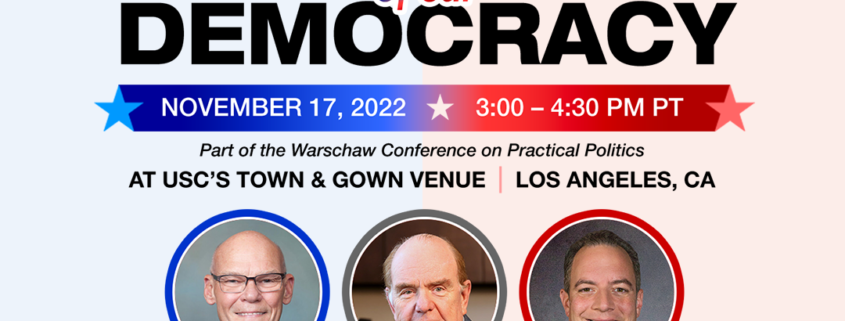Panel of Political Veterans: Midterm 2022 Democracy?
What did the election tell us about the nation’s polarization problem? And what do the results say about the current state of our democracy?
The people have spoken, and they are tired of the partisan fighting, agree James Carville and Reince Priebus. That was the takeaway shared by both panelists—political icon, Carville and former Republican National Committee Chairman Priebus—in a forum moderated by Bob Shrum, Director of the Dornsife Center at the University of Southern California.
“The American people have glazed over the vitriol,” Priebus said, and they decided not to blame senators, representatives, and governors on the ballot for the partisanship and rhetoric of the party leaders.
It’s always democracy in action on election day, Carville commented, whether the message delivered is a move toward centrism or a reaction against the status quo. “The people weighed in, they ran the show, and the politicians have to pay attention,” he said. “Maybe I’m an optimist. But I see a change in behavior, and I see it coming from the public.”
Election reform, a point of contention, seems to be one of the things the majority of the public has decided to come together on. “There are already states that do mail-in ballots, and do it right,” said Priebus. “It’s time for Republicans to stop complaining about mail-in ballots and accept that it’s election month, not election day. We need to look at the states who do it right, and copy them.”
Some of the strongest vitriol still surges through social media, and to some extent, the divisiveness in the mainstream media. There isn’t profit to be made in unity, the panelists agreed. There’s money in riling people up and agitating the click-bait culture of division that appeals to the basest instincts displayed on Tik Tok. “Eighty percent of people use the media like a drunk uses a lamppost,” Carville said. “For support, not illumination.”
However, the degree to which this is or isn’t reflected in the media—and the usefulness of arguing over media bias—is less important than it used to be. Mainstream media doesn’t have the power it used to, Carville suggested, because the whole dynamic of media consumption has changed. Guests who appear on the major media outlets align with their views, and the viewing public knows that. “When people go on shows, they have three talking points, and they tend to agree with their host. People see through that. They want to see something real.”
This time, in fact, there was no unrest and almost all the election results were accepted – even by those who lost.
When it comes to putting aside partisanship to get things done, there’s cause for optimism, they agreed. There are several markers of progress that required bipartisan support. For instance, infrastructure and marriage equality, Carville suggested; Priebus pointed to the disclosure of secret money in politics, and the current agreement toward China. “For the most part, Republicans agree on our new hawkish view of China, and for the most part, Democrats agree,” he said.
And both panelists agreed on the importance of supporting the next generation of candidates — a wealth of talent and energy just sitting in wait on the bench. Youth is also the primary source of optimism for both panelists. Take, for example, the student groups from both Texas A&M and USC that were engaged spectators of the panel event.
“I think of all the schools with students watching events like tonight’s panel, all over the country,” said Carville. “And I just want to tell you all, this is a fun business – don’t believe that it’s a God-awful business and not a place for nice people. Pitch in and get involved, and we’ll all be ok!”





